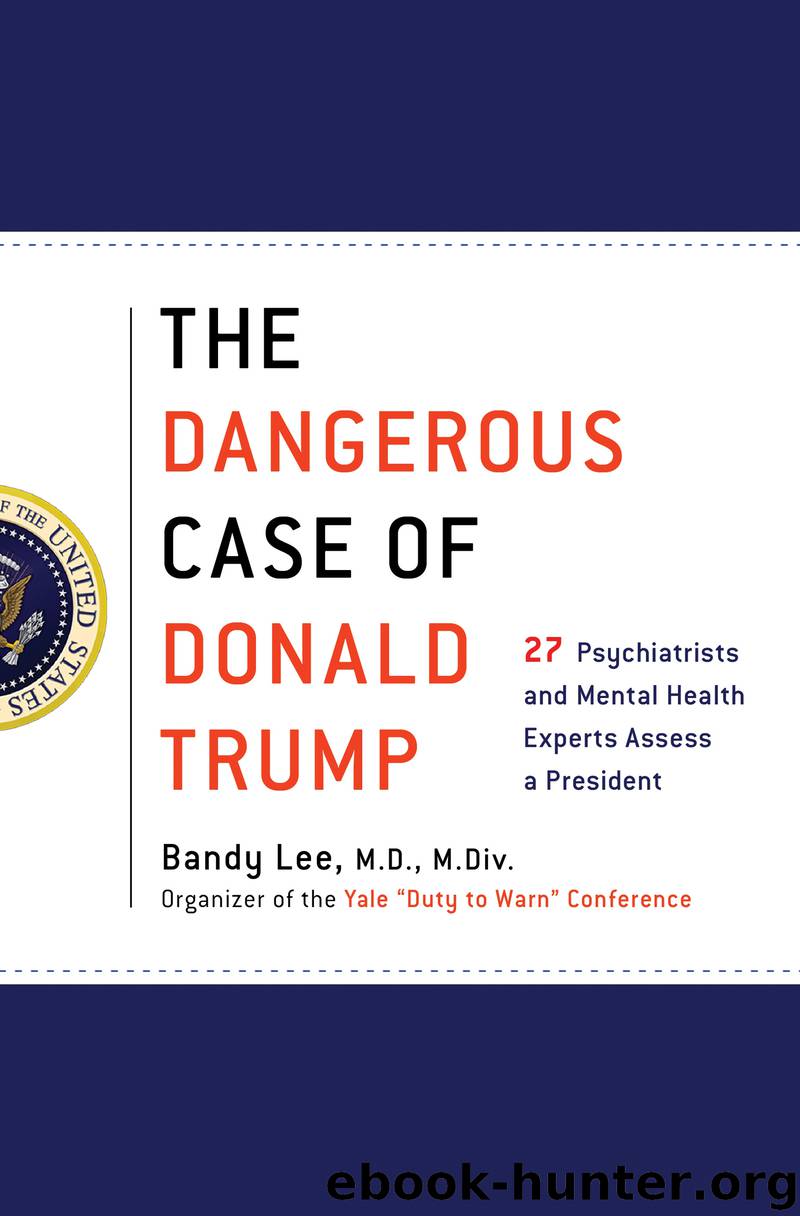The Dangerous Case of Donald Trump by Bandy X. Lee

Author:Bandy X. Lee
Language: eng
Format: epub
Publisher: St. Martin's Press
HEALTH, RISK, AND THE DUTY TO PROTECT THE COMMUNITY
HOWARD H. COVITZ, PH.D., A.B.P.P.
Don’t go loose-lipped among your people (but)
Don’t stand idly by either as your neighbor bleeds;
I am God.
Leviticus 19:161
This collected volume of essays is about the investigation of a tension between two goods, a balancing act that is at least as old as the Bible. Leviticus (see epigraph) argues for a version of confidentiality that is almost unlimited: “Don’t go loose-lipped among your people.” Indeed, the psalmist would specify further:
Who is the man who desires life.…
Guard your tongue against speaking ill and
your lips against uttering gossip. (Psalms 34:12)
Looking back to the Leviticus text, we see that an exception is immediately rendered, as there would be times when speaking up was necessary to protect another from harm. In traditional cantillation, the halfway melody mark of the sentence (esnachtah) is immediately before “I am God.” The intent of the ancient writer seems to be: Oh, yes, there is a tension between Confidentiality and the Duty to Warn and recognizing this tension holds the essence of Godliness … or Goodness, as we might say today. And after two to three millennia, the mental health community is just beginning to recognize this dialectic. This, indeed, is the dialogue that developed within the community of practitioners during and after the 2016 U.S. presidential election. This tension is known as the one between the Goldwater rule, which protects a limited privacy for public figures, and the duty to warn those who may be at risk of serious harm from the very same public figures.
At least three complexities stand in the way of offering up a simple solution: Are mental health professionals duty-bound to speak their truth about a presidential candidate’s fitness for duty, or should they, rather, be constrained by professional ethics from doing so? What are the measurements by which we evaluate the first? What are the injuries of its absence? Is it a matter of a personal decision, or a decision by the community in which one lives?
The second difficulty has to do with the following: When we investigate the wellness of an individual, are we focused on his freedom from disabling characteristics that compromise his own life or, rather, do we concern ourselves with whether he is a danger to himself or others? Finally, we will briefly turn to how we evaluate risk, whether publicly shared or not.
Two Types of Mental Illness
More than eighty years ago, in a polemic against religion and politically based theories, Freud asked, “Does psychoanalysis lead toward a particular Weltanschauung?” (Freud, Sprott, and Strachey, 1933, p. 158). Answering this question in the negative, Freud chose empirical science over what he considered to be illusion and emotion. His new psychotherapies would, if Freud had his way, rely on no assumptions whatever about the good life, but solely on scientific methodology and clear-minded examination of the observable. While this may seem perfectly reasonable, let me point out that the sciences—as is the case with the purest of them all, mathematics—depend
Download
This site does not store any files on its server. We only index and link to content provided by other sites. Please contact the content providers to delete copyright contents if any and email us, we'll remove relevant links or contents immediately.
| Administration & Medicine Economics | Allied Health Professions |
| Basic Sciences | Dentistry |
| History | Medical Informatics |
| Medicine | Nursing |
| Pharmacology | Psychology |
| Research | Veterinary Medicine |
The Art of Thinking Clearly by Rolf Dobelli(8841)
The 5 Love Languages: The Secret to Love That Lasts by Gary Chapman(8494)
Mindhunter: Inside the FBI's Elite Serial Crime Unit by John E. Douglas & Mark Olshaker(7834)
Becoming Supernatural by Dr. Joe Dispenza(7105)
Nudge - Improving Decisions about Health, Wealth, and Happiness by Thaler Sunstein(6633)
The Road Less Traveled by M. Scott Peck(6633)
Enlightenment Now: The Case for Reason, Science, Humanism, and Progress by Steven Pinker(6405)
Win Bigly by Scott Adams(6311)
Mastermind: How to Think Like Sherlock Holmes by Maria Konnikova(6235)
The Way of Zen by Alan W. Watts(5798)
Factfulness: Ten Reasons We're Wrong About the World – and Why Things Are Better Than You Think by Hans Rosling(4021)
The State of Affairs by Esther Perel(3926)
Gerald's Game by Stephen King(3918)
Man's Search for Meaning by Viktor Frankl(3631)
The Confidence Code by Katty Kay(3566)
Thinking in Bets by Annie Duke(3531)
The Worm at the Core by Sheldon Solomon(2917)
Enlightenment Now by Steven Pinker(2914)
Liar's Poker by Michael Lewis(2810)
